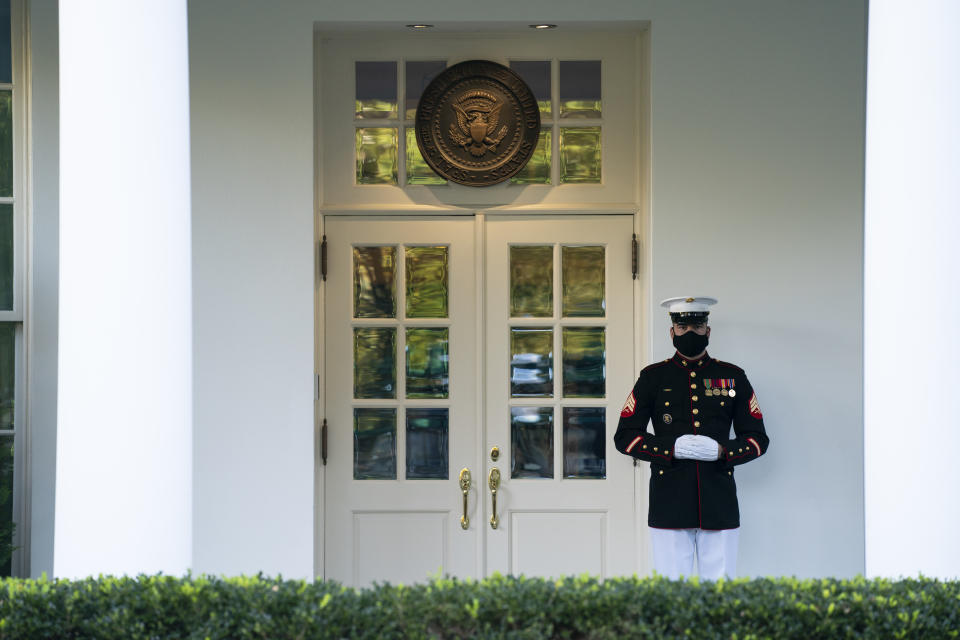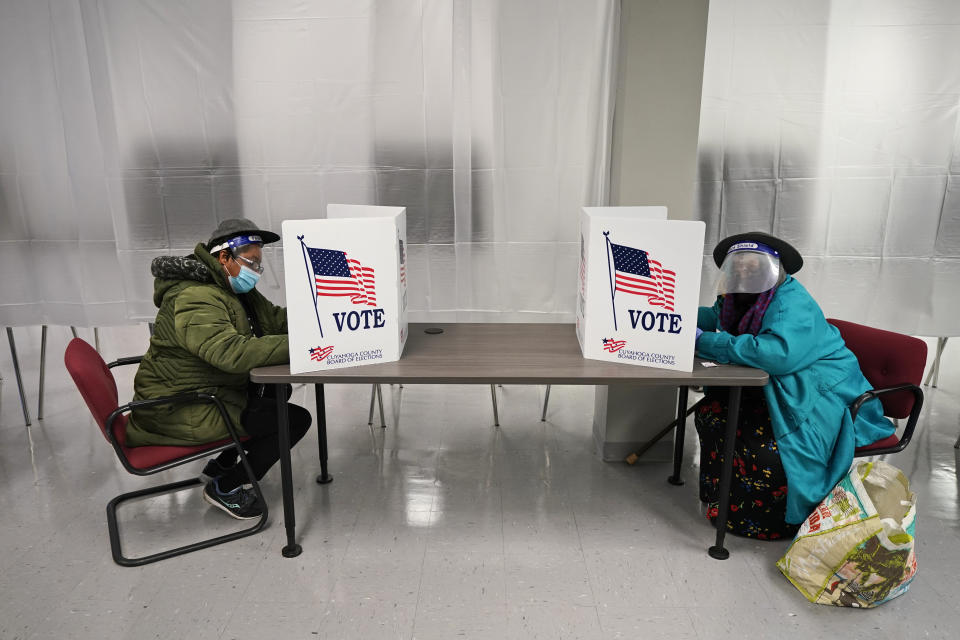Just over a week before the US election, lawsuits linger
Hundreds of lawsuits about voting have been filed before the Nov. 3 election. The cases concern the fundamentals of the American democratic process, including how ballots are cast and counted. Some of the challenges are being fronted by legal teams working for President Donald Trump and Democratic challenger Joe Biden. A look at some of the top lawsuits in battleground states:
ARIZONA: The 9th Circuit Court of Appeals halted an extension put in place for those who neglected to sign their early ballots before mailing them in, overruling a decision that favored Democrats. But the order said anyone who registered after Oct. 5 would get to keep their right to vote on Nov. 3 despite missing the original deadline. But those registrations had to be completed by Oct. 15.
IOWA: Republicans and Trump’s campaign have largely prevailed over Democrats in several lawsuits that have successfully limited mail-in voting. The Iowa Supreme Court left in place a new Republican-backed law that will block county elections commissioners from mailing absentee ballots to thousands of requesters who submitted applications that were missing some information. The court also upheld a state directive that invalidated tens of thousands of absentee ballot requests that were mailed to registered voters in three counties with their personal information already filled in. A judge has yet to rule on Democrats’ challenge to the Republican secretary of state’s rule that drop boxes must be located on county property and not at grocery stores or other community sites, but the impact of any ruling this close to the election is expected to be minimal.
MICHIGAN: Officials are mired in litigation over how long ballots can be counted after Nov. 3. State law requires the ballots to be counted by Election Day. But a state judge, citing mail delays, has ordered that they be counted if they are postmarked by Nov. 2 and arrive by Nov. 17. The Republican-led Legislature is appealing. The issue could be crucial in determining the winner of the presidential contest in the state, which Trump won by less than 10,000 votes against Hillary Clinton in 2016. Absentee voting has only been permitted since 2018, but some 2.7 million people have requested absentee ballots.
MINNESOTA: In Minnesota, Republicans challenged a state court agreement that extended the deadline for counting absentee ballots by seven days because of the pandemic. A federal judge recently upheld the state consent decree that allows for the extension for ballots postmarked by Nov. 3. Republicans are appealing. Meanwhile, Democratic U.S. Rep. Angie Craig recently won her challenge to a state law that pushed voting for her 2nd district seat to February due to the Sept. 21 death of a third-party candidate. Craig’s Republican challenger, Tyler Kistner, is appealing, arguing that moving the election back to Nov. 3 after an announced postponement would disenfranchise thousands of voters. If the delay is reinstated it could have national implications if the presidential election remains in dispute in January and Craig’s seat remains empty.
NEVADA: The Democratic-led Legislature this year passed a law that sends mail-in ballots to every registered voter and lets someone else return it on the voter’s behalf. The latter practice, known as ballot harvesting, had previously been illegal. The law, signed by Democratic Gov. Steve Sisolak, also let county election officials start counting mailed ballots on Oct. 19. The Trump campaign challenged the law, suggesting mail-in voting was rife with fraud, but a federal judge said the campaign failed to show any harm.
NEW HAMPSHIRE: A judge in April struck down a 2017 New Hampshire law that made it more difficult for people to vote if they registered the month before the election. The judge said the added paperwork was “unreasonable.” The Republican-led Legislature had passed the law after Trump’s loss there in 2016. State officials have appealed to the state Supreme Court. Meanwhile, the American Federation of Teachers, citing the pandemic, challenged some state voting procedures in August, including an Election Day deadline and lack of prepaid postage for absentee ballots. Both the Trump campaign and state officials pushed back, and a judge mostly dismissed the suit while ordering the state to help would-be voters obtain registration forms.
NORTH CAROLINA: The Trump campaign and the Republican National Committee are suing in federal court to block state election officials from enforcing rule changes that could boost the number of ballots counted. That includes guidance that will allow the fixing of absentee ballots with deficient information without forcing the voter to fill out a new blank ballot.
OHIO: The possibility of multiple ballot drop boxes in Ohio counties has been disallowed after a series of federal court rulings. As a result, most counties have one box per election board during early voting. Democrats have argued that Republican Secretary of State Frank LaRose’s directive for one box per election board would limit voters’ access to the polls. A LaRose directive allows ballot drop boxes at locations “outside” boards of elections. A federal judge ruled that meant they could be placed at multiple locations, a decision at odds with LaRose’s intentions. A three-judge panel of the 6th U.S. Circuit Court of Appeals this month rejected that judge’s decision. LaRose did allow the elections board in Cuyahoga County, home to Cleveland, to place a second outside drop box adjacent to board headquarters. A state appeals court ruled that requests for an absentee ballot cannot be sent by fax or email, finding it could swamp local election officials and threaten the security of the election.
PENNSYLVANIA: Just 15 days before Election Day, the U.S. Supreme Court resolved a key election fight with a 4-4 ruling that allows mail-in ballots in the battleground state to be counted for three days after Election Day. A new lawsuit filed Thursday challenged the deadline. Now election officials are waiting for the state Supreme Court to decide how to handle disputes over voters’ signatures on mail-in ballots. More than 9 million people registered to vote by Monday’s deadline, and nearly 3 million requested ballots by mail. About 900,000 of them have been returned. Officials fear they won’t be able to announce a prompt winner in the presidential race unless they start processing the mail-in ballots early, but lawmakers have failed to reach a deal to allow that.
VIRGINIA: The key court case over the election in Virginia involves the requirement that absentee voters find a witness to watch them sign their ballots. After the League of Women Voters filed suit over the issue, a federal judge issued a decree allowing voters to skip that step given the pandemic if they don’t feel it’s safe to have a witness present. The Republican Party of Virginia, which opposed the consent decree, is now challenging the state guidance on the issue, saying it’s likely to confuse voters.
WISCONSIN: A federal appeals court overturned a lower court’s ruling granting a six-day extension for counting absentee ballots in Wisconsin as long as they are postmarked on or before Election Day. The ruling was a victory for Republicans, while Democrats and their allies have asked the U.S. Supreme Court to overturn the decision. That seems unlikely given that the court deadlocked on a similar case out of Pennsylvania.
___
AP’s Advance Voting guide brings you the facts about voting early, by mail or absentee from each state: https://interactives.ap.org/advance-voting-2020/.




